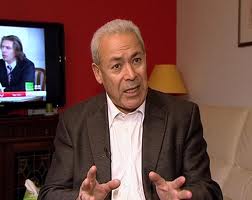Two native Syrians, one a distinguished professor at France’s Sorbonne and the other a Paris-based political analyst, draw contradictory conclusions on the prospects for a spring revolution in Syria.
They are:
(1) Dr. Burhan Ghalioun, Director of the Centre d’Etudes sur l’Orient Contemporain (CEOC) in Paris and a Professor of Political Sociology at the Université de Paris III (Sorbonne Nouvelle). He earned his Ph.D. in Political Science from the Sorbonne. He is the author of several authoritative books (including "Le Malaise Arabe: l’Etat contre la Nation," "Islam et Politique: la Modernité Trahie,"”Crise de la Politique: l’Etat et la Religion” and “La Culture Arabe: Entre Modernisme et Traditionalisme”). He has also authored over a hundred academic articles in various journals on political Islam, Arab political culture and state and society relations in the Arab World.
(2) Ghassan Al-Imam, a well-known journalist and political commentator now writing regularly for the Saudi daily Asharq al-Awsat.
Ghalioun writes in part:
“…Frustration, the dearth of prospects and the absence of hope” sparked the movement for change in Syria on March 15. The regime is misguided to think swelling the numbers of existing detainees can now stifle the spark. “What happened and is happening in Damascus, Banias, Deraa, Homs and Qameshli is the preliminary sign of the revolution for dignity and freedom which Syria has been carrying in its womb for a long time without being able to bring it to life.”
 |
| Dr. Burhan Ghalioun |
Given the sweeping nature of the pan-Arab uprising, it will be increasingly difficult for Syria to stub out the fire of revolt, even if it mandated its security services to step up the detention, mistreatment and abuse of citizens. That will only inflame public resentment.
“Arab writers, intellectuals and thinkers who consider themselves close to Syria have persistently urged Syrian officials” to bury their iron fist policies and “quickly begin political reform liable to fulfill the Syrian people’s legitimate aspirations.”
Syrian leaders are obviously unaware that the Syrian people have changed dramatically, if only by “living the pan-Arab revolution hour by hour on their TV screens.” Syrian leaders are also unaware the pan-Arab revolution has changed the world altogether, the Arab League included after the Libya debacle.
It is unacceptable to see any political leader wage war on his people simply to cling to power. The international committee cannot -- in this age of globalization, technology and social media – tolerate politicians who defy international laws and norms in order to intimidate their people through army regulars or security services.
The Syrians are not less deserving than other peoples. They are not quasi-human. They are not dismissive of the value of dignity and unconscious of the meaning of freedom. They won’t accept the status of half-citizens. They aspire to governance based on sharing and on recognition of their competence and their basic rights and freedoms. “They also yearn to do away with the security services’ tyranny, loathsome control of their lives and decimation of their hopes and dreams.”
 |
| Ghassan Al-Imam |
Imam, however, is downbeat. Here is how he explains why a mass uprising in Syria is “impossible”:
“I said earlier the most potent weapon of an intifada is its ability to move would-be protesters from computer screens to the streets… Short of this, settling for low turnouts on the streets is a daring venture on Bashar Assad’s home turf, where brutal dialogue is instant and by means of truncheons and arrests…”
Is a peaceful intifada in Syria possible if a million-strong march flooded the streets?
“I am all but certain it will be an impossible uprising. A regime with a constricted popular base cannot remain quiet and peaceable when it catches sight of a million people gathering in Damascus’s al-Marjeh (Martyrs’) Square…
“Why is a peaceful uprising possible in Egypt but impossible in Syria? Frankly: because Syria is not Egypt. There are 18 religious sects, denominations, faiths, confessional communities and ethnic groups in Syria while Egypt has a cohesive social fabric that dates back 7,000 years…”
After ruling Iraq and Syria for some 50 years, the Baath Party has degenerated into clan rule in Iraq and sectarian rule in Syria. Iraq’s Sunnite clan won’t submit to the authority of the Shiite majority. In Syria, the Alawite minority in turn won’t surrender power to the Sunnite majority.
“Brushing aside what I heard in person from President Bashar and the oddities I read about reform and democracy, let me state the uprising in Syria won’t be peaceful and the state authority’s response won’t be refined…
“Should the uprising stage sit-ins on the streets and in public squares and manage to cripple the government administration through a civil disobedience campaign, would the regime give way à la Hosni Mubarak and Zine El Abidine Ben Ali?
“There’s no Mubarak or Ben Ali in Syria. There are the Revolutionary Guard’s tanks commanded by the president’s brother Maher Assad and parked at Damascus’s gates…”
In the event of a bloody crackdown on the intifada, will the Syrian army intervene to disband the intifada or dismiss the regime? The Egyptian army chose to break up both the intifada and the regime. In Syria, the fearsome security apparatus neutralized the army even after the regime restructured the armed forces by recruiting hundreds of thousands of foot soldiers and placing them all under the command of Alawite officers.
“I recognize that the factional structuring of the army gave Syria several decades of peace and security. But is such odd structuring of a national army logically and constitutionally acceptable in a present-day state?
“Logically too, even if sidelined and neutralized, a factional army will not betray the (Assad) family regime. That’s why I personally dismiss the chances of the army remaining neutral. I expect it to take the side of the regime,” which shares its DNA.
“Accordingly, neither the army nor the regime will remain peaceable in dealing with a million-strong intifada…”
